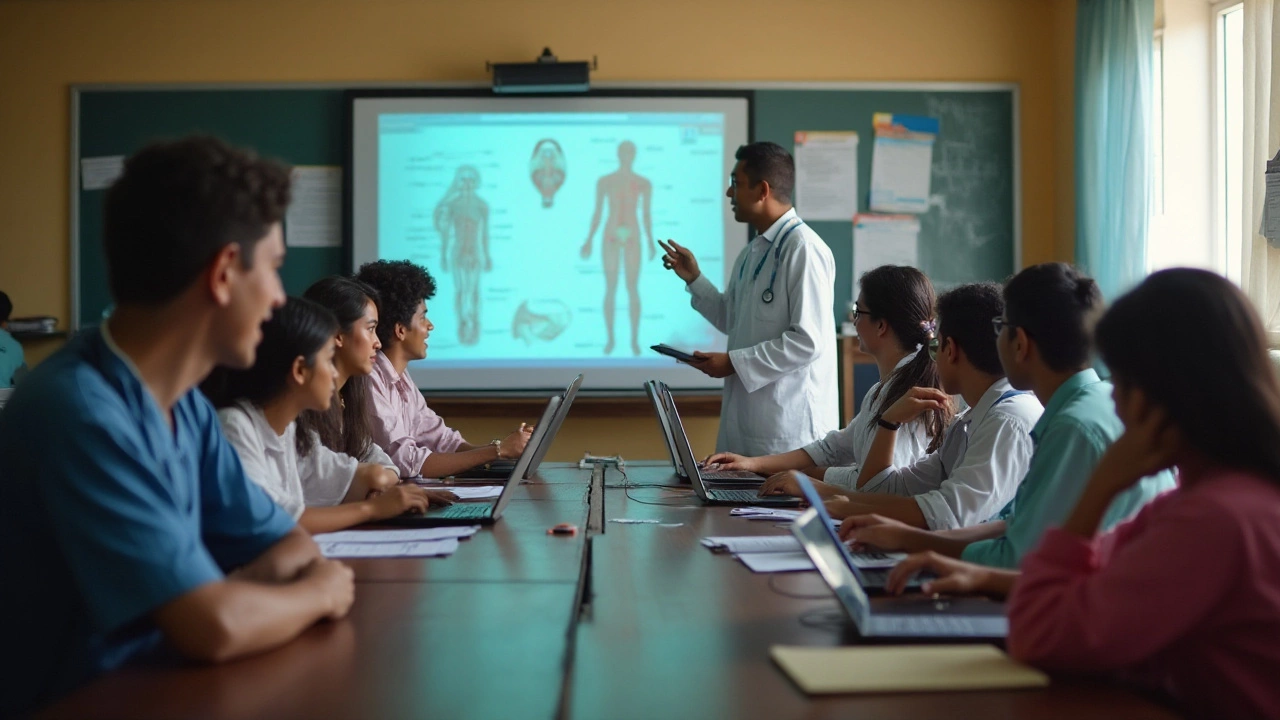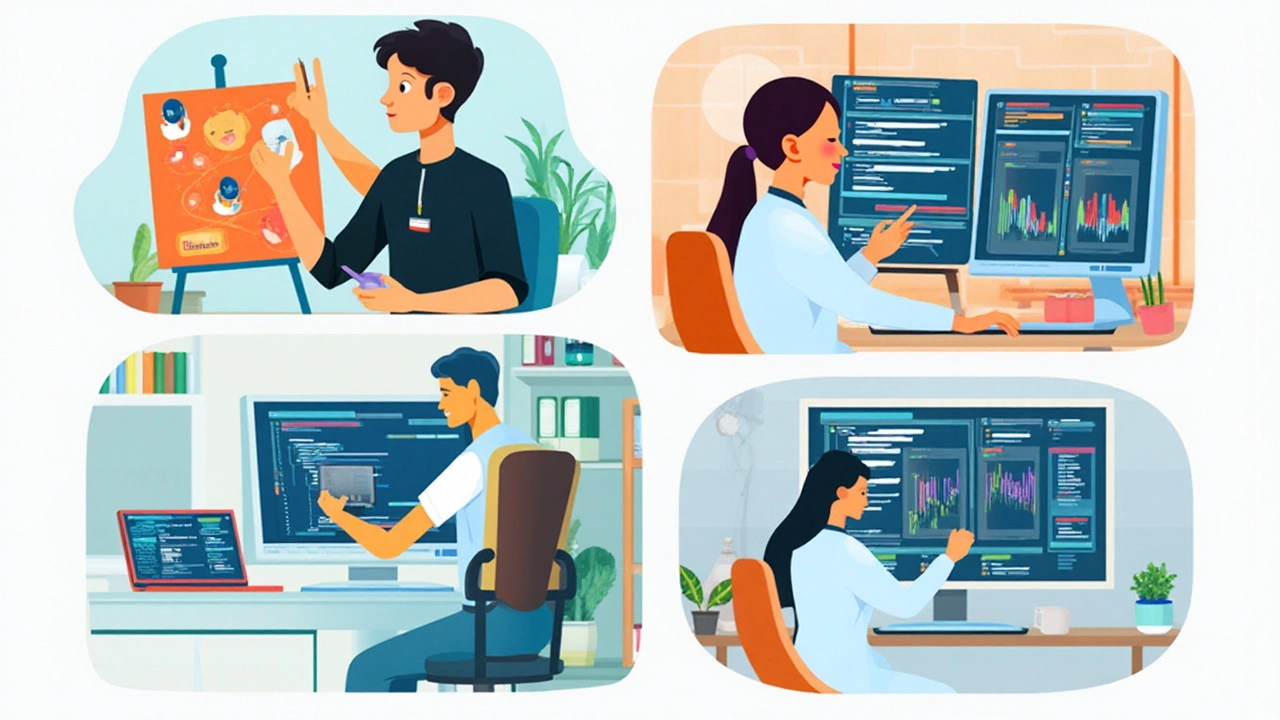Nov
29

- by Dhruv Ainsley
- 0 Comments
The landscape of career opportunities is shifting rapidly, and keeping pace with these changes is essential for anyone aspiring to stay relevant in the modern workforce. With technology driving many of these transformations, digital skills are becoming increasingly critical. However, the appeal of stable and rewarding career choices extends beyond tech-related fields.
Healthcare remains a robust sector, consistently offering enduring opportunities as the world faces evolving health challenges. Meanwhile, careers focused on sustainability and the environment are emerging as vital due to global ecological concerns. Finance and data analysis roles are also in high demand, driven by the need for economic insights and strategic decision-making.
In this dynamic environment, online courses emerge as pivotal tools. They offer flexible pathways to gain knowledge and skills tailored to these high-demand areas. This exploration into the most sought-after careers and the corresponding educational avenues can guide you in making informed decisions for your future.
- Rising Demand for Digital Skills
- Healthcare's Growing Opportunities
- Sustainability and Green Careers
- Finance and Data Analysis
- Creative Industries Thriving
- Choosing the Right Online Course
Rising Demand for Digital Skills
The world is changing at an astonishing pace, and digital skills are now more important than ever. As technology infiltrates nearly every aspect of modern life, careers centered around digital skills have become highly sought-after. From software development to cybersecurity, these fields are seeing a remarkable surge in demand. With businesses moving their operations online, the need for expertise in areas like web development, app creation, and user experience design is skyrocketing. This trend is not just confined to tech companies; industries ranging from healthcare to finance are also seeking talent skilled in digital transformation.
In the tech industry, programming languages like Python, Java, and JavaScript continue to be crucial for those looking to enter or advance in the field. A strong foundation in these languages provides the flexibility needed to adapt to various roles such as full-stack developer or mobile app creator. Additionally, roles involving data, such as data scientist and data analyst, are in demand due to the need for insights that drive strategic decisions. The skill to interpret and manage vast datasets is indispensable, serving as the backbone for innovations across multiple sectors.
Alongside these technical proficiencies, the digital realm values creativity and problem-solving abilities. This has led to emerging opportunities in digital marketing where crafting engaging online content can significantly impact a company's brand visibility. Understanding SEO, social media marketing, and analytics tools allows professionals to reach and resonate with a broader audience. To quote from the World Economic Forum, "Skills gaps continue to be high as in-demand skills across jobs change in the next five years."
Cybersecurity is another area experiencing explosive growth. With cyber threats becoming more sophisticated, safeguarding digital information is a top priority for all organizations. Professionals well-versed in cybersecurity strategies are not only ensuring day-to-day operational security but are also protecting sensitive customer data. The demand for cybersecurity analysts, ethical hackers, and network security specialists has never been higher.
As industries adopt AI and machine learning technologies, the horizon for careers in digital skills looks even broader. These technologies are not only reshaping existing jobs but also creating new ones that were unheard of a few years ago. Machine learning engineers, AI specialists, and robotics experts are becoming crucial for businesses that want to leverage the full potential of AI. An emphasis on continuous learning and skills development is essential to keeping up with these rapidly changing digital trends.
Healthcare's Growing Opportunities
The healthcare industry has consistently been a bedrock of the global economy, providing not only essential services but also boundless career opportunities. This sector is experiencing a remarkable surge, driven by an aging population, technological advancements, and the global emphasis on health and well-being. Particularly, the demand for skilled professionals has skyrocketed, making healthcare one of the most in-demand careers today. Interestingly, the U.S. Bureau of Labor Statistics projects that healthcare occupations will grow much faster than the average for all other occupations, attributing this growth to both the needs of an aging generation and advancements in healthcare technology.
Nurses and healthcare practitioners are at the heart of this booming field. There is a pressing need for registered nurses, nurse practitioners, and physician assistants, among others. Their roles have expanded beyond traditional settings, with telehealth becoming a significant part of healthcare delivery. This shift not only accommodates the healthcare needs during emergencies like pandemics but also makes healthcare more accessible to remote areas. Equally important, mental health awareness has seen an increase, paving the way for more jobs in psychology, counseling, and psychiatry.
These expanding opportunities have been matched by a rise in specialized education and online courses. Online learning platforms are making healthcare education more accessible, offering a range of courses tailored to various specialties, from basic caregiving to advanced medical research. These courses are designed to cater to both beginners who are just stepping into the industry and seasoned professionals looking to update their skills. With the flexibility that online courses provide, learners can study at their own pace, balancing education, work, and personal commitments effectively.
Dr. Patrice Harris, former president of the American Medical Association, noted, "As we continue to grapple with health challenges, the demand for skilled healthcare professionals will only rise. The need for a strong healthcare workforce has never been more critical." This emphasis on professional development is essential, especially when innovative treatments and healthcare practices are continually emerging.
Notably, data shows a significant increase in the enrollment of medical courses online. In a study conducted by Harvard, there was a reported 30% increase in enrollments in healthcare-related online courses over the past year. This trend underscores the importance of digital platforms in shaping the future of healthcare education and ensuring that professionals are equipped with the latest knowledge and competencies necessary to meet the evolving demands of this vital sector.
The intersection of technology and healthcare has also introduced roles for health information technicians, equipped to manage patient data in electronic formats securely. As patient data management becomes increasingly digitized, the demand for professionals with IT skills in healthcare settings continues to rise. These roles ensure that health information systems are used effectively, ultimately improving patient care outcomes and operational efficiency within healthcare facilities.

Sustainability and Green Careers
In today's world, sustainability and green careers are more than just buzzwords; they are vital components of a global movement towards a more environmentally conscious and livable planet. As environmental concerns escalate, from climate change to resource depletion, there is a pressing need for professions that focus on sustainability. These careers not only aim to protect the environment but also foster innovation and job creation in industries that prioritize ecological balance. The demand for green jobs is driven largely by governments and organizations committing to reduce their carbon footprints and implement sustainable practices.
Exploring specific roles within this sector reveals a diverse array of opportunities. Environmental engineers, for instance, are pivotal in designing projects that enhance ecosystems and reduce pollution. They often work on building sustainable structures, developing water conservation systems, and improving waste management processes. According to the U.S. Bureau of Labor Statistics, the employment of environmental engineers is projected to grow as industries continue to require solutions that adhere to environmental regulations. Let's not forget the role of renewable energy technicians who are at the forefront of the transition to sustainable energy sources like solar and wind power.
The rise of these in-demand careers has been accompanied by an increase in educational courses tailored to sustainability. Institutions worldwide offer specialized programs in environmental science, sustainability management, and renewable energy technologies. These programs equip students with the expertise needed to tackle environmental challenges head-on. Such education not only prepares individuals for existing roles but also catalyzes the creation of new career paths within emerging green industries.
Growing Need for Expertise
Experts in sustainability need a blend of technical skills, creative problem-solving abilities, and a profound commitment to ethical environmental stewardship. Among these needs is the capacity to navigate complex regulatory environments, a skill that is increasingly important as governments implement stricter guidelines to curb environmental damage. According to a report by the International Labour Organization, transforming economies towards greener modalities could result in the creation of millions of jobs globally, emphasizing how critical this sector is to future economic stability.
The renewable energy sector alone is expected to employ over 24 million people by 2030, highlighting the sector's potential for career growth and impact.
Moreover, businesses are recognizing the advantages of sustainable practices beyond regulatory compliance and potential cost savings. Many consumers today prefer to engage with brands and businesses that demonstrate a commitment to sustainability, offering another reason for the increasing importance of green careers. This consumer-driven demand for sustainability not only propels growth within these sectors but also makes them resilient in changing economic climates.
For those considering a path in sustainability, online courses can be a gateway to acquiring the necessary skills. Courses offered by platforms such as Coursera and edX cover a range of topics from environmental policy and strategy to the nitty-gritty of implementing green technology. These courses often feature instructors who are leaders in their fields, bringing practical insights and cutting-edge research to learners around the globe. Engaging with these learning opportunities not only prepares individuals for current job openings but also empowers them to be at the forefront of a rapidly evolving industry focused on preserving our planet for future generations.
| Job Title | Projected Growth | Median Salary |
|---|---|---|
| Environmental Engineer | 5% increase | $92,120 annually |
| Renewable Energy Technician | 11% increase | $52,920 annually |
Finance and Data Analysis
In today's data-driven world, the roles of finance and data analysis have emerged as pivotal players in shaping business strategies and decision-making processes. Companies across various industries are increasingly relying on data analysts to sift through massive datasets to extract meaningful insights. These insights are crucial as they guide strategic decisions that can influence a company's direction and profitability. In finance, professionals skilled in data analysis are becoming indispensable, as businesses look to optimize operations and enhance fiscal efficiency. The integration of sophisticated data tools and visualization software has revolutionized how financial data is interpreted, making it essential for analysts to remain adept with these emerging technologies.
As businesses strive for more nuanced understandings of market trends, risk assessments, and investment opportunities, finance and data analysis careers continue to flourish. The demand for skilled individuals capable of blending financial acumen with analytical prowess is growing. This trend is driven by the need to translate complex data into actionable business strategies. According to a report by the Bureau of Labor Statistics, employment of financial analysts is projected to grow 6% from 2020 to 2030, reflecting the high demand for experts in this field. Furthermore, the rise of big data and artificial intelligence has expanded the roles of data analysts, intertwining their responsibilities with financial tasks such as forecasting and valuation analysis.
Educational pathways have adapted to these evolving demands, with a multitude of online courses available that focus on the blend of finance and data analysis. Platforms such as Coursera and edX offer specialized courses that equip students with essential skills in statistics, data mining, and financial modeling. These courses not only cover theoretical aspects but also provide practical insights through hands-on practice and real-world projects. Investing time in these educational resources can significantly boost one's career prospects in this competitive field. They offer flexible learning environments, which is crucial for professionals looking to upskill while balancing current work commitments.
It's not just technical skills that these roles require; communication skills are becoming increasingly important. Analysts must be adept at presenting their findings to non-technical stakeholders to effect change. This requires a blend of storytelling and data visualization techniques, ensuring that complex data is accessible to all members of an organization. As a seminal report from McKinsey & Company suggests, “Effective data analysis is as much about bringing clarity and context to numbers as it is about the numbers themselves.” This highlights the need for a holistic approach combining technical and interpersonal skills.
For those interested in pursuing a career in this domain, it's beneficial to stay informed about the latest tools and trends. Analytical software such as Tableau and Power BI are in high demand, with proficiency in these tools being a distinctive asset for job seekers. Similarly, understanding programming languages like Python and R can significantly enhance one's ability to process and analyze data efficiently. Certifications in these areas can provide a competitive edge, reassuring employers of a candidate's readiness to tackle complex analytical tasks.
Ultimately, the interplay between finance and data analysis will only grow stronger as businesses continue to capitalize on data for strategic insights. For professionals in this field, the journey involves continual learning and adaptation to new technologies and methodologies, ensuring relevance and effectiveness in an ever-evolving landscape. By staying ahead of the curve, professionals can position themselves as valuable assets to any organization, driving innovation and growth through informed financial analysis.

Creative Industries Thriving
In today's digital era, where imagination and innovation meet technology, the creative industries are experiencing an unprecedented boom. Fields such as graphic design, animation, digital marketing, and content creation are capturing the spotlight, driven by the evolving demands of businesses and consumers alike. The infusion of digital platforms has opened avenues for creativity to flourish globally, making the creative sector one of the most dynamic and high-growth areas. As brands increasingly prioritize digital presence, skilled professionals who can craft compelling narratives and visually appealing content are in high demand. This shift is creating a host of opportunities for those with a passion for creativity and a knack for technology, as companies seek to enhance their brand identity and engage more meaningfully with their audiences.
An intriguing aspect of the flourishing creative industries is their sustainability even in economic downturns. This resilience is partly due to the universal demand for fresh and engaging content, which fuels the need for creative thinkers adept in using modern tools. Industries ranging from fashion to film, and music to marketing, rely heavily on individuals skilled in storytelling and visual arts. According to a report by the U.S. Bureau of Labor Statistics, employment in the media and entertainment sector is projected to grow by 13% from 2021 to 2031, adding over 160,000 jobs. This thriving sector isn't just about traditional arts; the rise of new media, virtual reality, and augmented reality is opening entire new realms for artistic exploration and career opportunities.
Opportunities and Skills Needed
A fundamental driver for the success in creative careers is the ability to leverage diverse skills. Proficiency in digital tools like Adobe Creative Suite, 3D modeling software, and content management systems can significantly boost employability. Moreover, strong communication skills are essential to effectively convey ideas and collaborate with clients and team members. Today’s creative professionals are finding success through online courses designed to enhance such key skills efficiently. Platforms like Coursera, edX, and Skillshare offer a breadth of courses targeting beginner to advanced levels, ensuring that learners can meet the industry's varied skill demands. These courses are invaluable for not only honing technical skills but also for understanding market trends, consumer psychology, and the latest technological advancements impacting the creative sphere.
"The creative industries are not just about nice-to-have arts skills; they are essential economic engines that support robust job creation across internet-era economies," an excerpt from a study at the Brookings Institution noted, highlighting the indispensable role these sectors play in the modern world.
Creative industries also thrive on the freelance model, which offers flexibility to both the professional and the client. With the rise of the gig economy, many creative professionals are choosing freelancing to balance work and personal life, while still working with top-tier brands and projects. Websites like Fiverr, Upwork, and 99designs have made it easier than ever for creatives to connect with potential clients worldwide, further underscoring the fluid nature of career paths in these industries. As these opportunities grow, they redefine what it means to be a professional in the digital age, encouraging a shift towards more collaborative and cross-disciplinary work environments. Individuals interested in the creative domain can leverage these resources to craft a career that is not only vibrant and fulfilling but also aligned with their personal values and interests.
Choosing the Right Online Course
In today’s rapidly evolving job landscape, selecting the right online course can be a pivotal move for anyone looking to boost their career. With a plethora of choices available, it may feel overwhelming at first to discern which course aligns with your aspirations. Start by identifying your career goals and the skills necessary to achieve them. Many platforms offer courses tailored for in-demand careers, so knowing what you want will help narrow down your options significantly. Whether you're diving into tech fields or focusing on green initiatives, there's likely a course designed to enhance your future skills.
Another essential factor to consider is course content and structure. Look for courses that provide comprehensive material and interactive elements such as projects or quizzes that reinforce learning. Verify the credentials of the course provider as well; reputable institutions tend to deliver high-quality education. Keep an eye on ratings and reviews, which can provide insights from past learners. Additionally, platforms like Coursera, Udemy, and LinkedIn Learning have partnerships with top universities and companies, ensuring their courses align with industry needs. There's something to be said about the prestige of learning from a well-regarded source. As Henry Ford once quoted,
"Anyone who stops learning is old, whether at twenty or eighty."
Cost and accessibility remain crucial elements in choosing a course. Online education offers the benefit of affordability with many free or substantially discounted courses compared to traditional learning environments. That said, investing in a paid course can often yield greater benefits, such as earning a recognized certificate or gaining access to exclusive resources and mentorship. Ensure the course format fits your lifestyle, offering flexibility to learn at your own pace. Some courses are self-paced, allowing learners to progress as quickly or slowly as they choose, while others follow a set schedule to maintain a cohort experience. Importantly, always check if the technology platforms they use are compatible with your devices.
Before enrolling, it’s wise to consider course completion rates and the success stories they foster. If a course has high completion rates, it’s an indicator that it has engaged learners effectively. Testimonials and case studies can provide additional insights into how the course has helped shape participants’ careers. When feasible, reach out to alumni networks or community forums to get firsthand feedback about the course. Often, these communities offer invaluable advice and support regardless of where you are on your learning journey. It's an ethos of learning that enables you to adapt in this fast-paced world.
To wrap up, always stay informed about the current and upcoming trends in the job market and use this knowledge to guide your decisions. Be strategic in your choices, ensuring that each course you take is a stepping stone that aligns with your long-term objectives. Remember, your commitment to continuous learning is perhaps the greatest asset you can invest in as you prepare for career growth and greater opportunities ahead.





